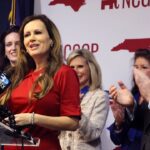Global Courant 2023-05-05 18:37:41
Main image: fact bulletins
On Thursday, tech executives were summoned to the White House and told they had a “moral” obligation to protect the public from the dangers of artificial intelligence (AI). The executives, including Google’s Sundar Pichai, Microsoft’s Satya Nadella and OpenAI’s Sam Altmann, were told it was their responsibility to ensure the safety and security of their AI products and that the administration was open to new rules and legislation regarding artificial intelligence.
Recent artificial intelligence (AI) products such as ChatGPT and Bard have caught the attention of the public. These products allow everyday users to interact with “generative AI,” which can summarize information from multiple sources in seconds, debug computer code, write presentations, and even write poetry that plausibly sound like it was human-generated. However, its implementation has sparked a renewed debate on the role of AI in society by providing a tangible illustration of the potential risks and benefits of the new technology.
After the meeting, US Vice President Kamala Harris said in a statement that the new technology could compromise security, privacy and civil rights, but also has the potential to improve people’s lives. She stated that the private sector had an “ethical, moral and legal responsibility to ensure the safety and security of their products”.
The White House also announced a $140 million (£111 million) investment from the National Science Foundation to establish seven new AI research institutes. Both politicians and technology leaders have called for better regulation of emerging AI. Geoffrey Hinton, the “godfather” of AI, resigned from Google earlier this week, saying he now regrets his job. He told the BBC that some of the risks posed by AI chatbots were “quite frightening”.
A letter signed by Elon Musk and Apple co-founder Steve Wozniak in March called for a halt to the technology’s rollout. Lina Khan, the head of the Federal Trade Commission (FTC), outlined her views on how and why AI should be regulated on Wednesday. Concerns have been raised that artificial intelligence (AI) could quickly replace people’s jobs, and that chatbots such as ChatGPT and Bard could be inaccurate and lead to the spread of misinformation. There are also concerns that generative AI could violate intellectual property laws. AI voice cloning can exacerbate fraud AI-generated videos can spread false information.
However, advocates such as Bill Gates have resisted calls for a “pause” from AI, claiming that such a move would not solve the “challenges” ahead. Mr. Gates believes it is preferable to focus on how best to apply advances in artificial intelligence. Others think there is a risk of overregulation, which would give Chinese tech companies a strategic advantage.
The meeting at the White House is the latest in a series of discussions about AI and its impact on society. As technology advances, policy makers and tech executives will need to figure out how to regulate it so that everyone benefits rather than just a select few. The risks of artificial intelligence are clear, but so are the benefits. It is up to those in power to strike the right balance between regulation and innovation to ensure that AI is used to benefit society as a whole.
Finally, the White House meeting with technology executives emphasized the private sector’s importance in ensuring the safety and security of their AI products, while also recognizing the potential risks and benefits of AI. The debate over the role of AI in society continues, with both politicians and technology leaders calling for stricter regulation. As AI progresses, it will be up to policymakers and tech executives to strike the right balance between regulation and innovation to ensure that AI benefits society as a whole.



